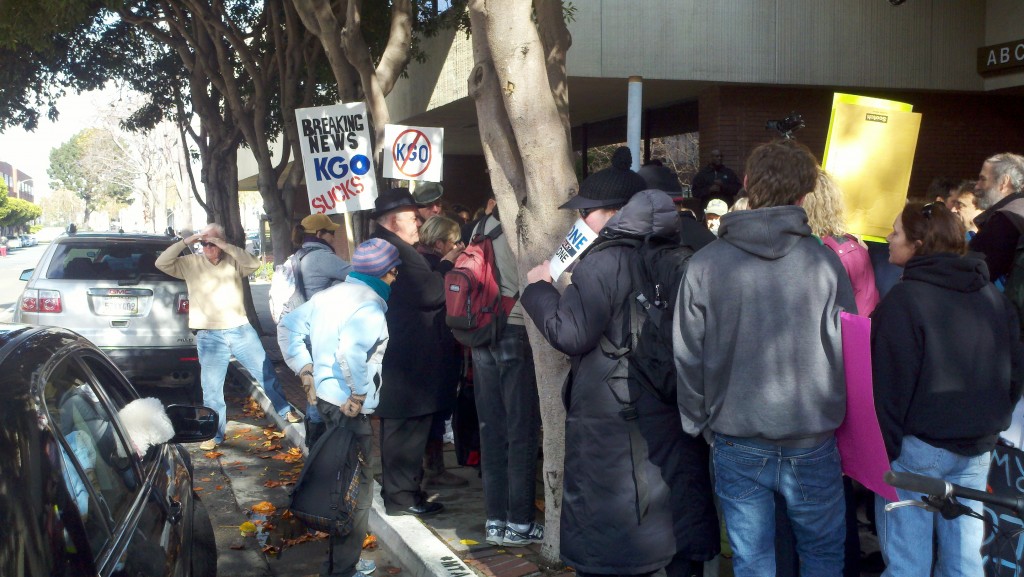I am reviewing the furious responses of our readers to Eric Klein’s story on the format change at KPOJ in Portland. Only ten days ago it was Progressive Talk Radio. Now it is a sports channel.

Protest against KGO’s purge of popular talk radio hosts, San Francisco; 12/15/2011; photo: Matthew Lasar
“You’ve got to be kidding me!” one comment exclaims.
“Put talk radio back on KPOJ immediately! We have enough sports stations already but with this latest take over by Clear Channel we do not have any liberal talk radio stations in the greater Portland area — a hugely liberal area as clearly demonstrated in this past election. Clear Channel is a predator. I will not listen to KPOJ until liberal talk is resumed and I will advise all of my sports enthusiast friends not to listen, either. That should be no problem inasmuch as they have 2 other channels from which they can get their sports fix. Shame on Clear Channel!!!!”
The rage obviously impressed my colleague Paul Riismandel as well. “I love how many commenters respond to @ RadioSurvivor stories like we changed their favorite station’s format,” Paul tweeted a few days ago.
Indeed, I’ve been reading these kind of tirades with sympathy ever since I started writing about radio almost 20 years ago—more so since I helped co-found Radio Survivor with Paul and Jennifer Waits. There was the uproar over the dismissal of a pack of hosts at KGO talk in San Francisco in late 2011. In 2009 we followed the outrage over the shutdown of San Francisco’s Energy 92.7 FM, then home to popular morning show deejays Fernando and Greg.
It’s gotten to the point where I feel like I can track these uproars over stages—the five stages of commercial radio format change grief.
1. Stage one: shock
Imagine sitting next to an old friend, and when he talks, he suddenly sounds like somebody else. For long time radio station listeners, it’s not that different an experience when a cherished radio signal changes formats.
In the first stage of this process, listeners tune into their favorite station and react with shock. Here’s another comment from our story on KPOJ: “what are you people thinking. sports talk radio. Can you get any more boring than that. I thought my radio had gone wacko when all I heard was sports.”
Reactions like “I thought my radio had gone wacko” are common in stage one—the response exacerbated by the fact that the company typically gives no advance notice of the change.
2. Stage two: the discovery of others
In stage two, listeners check news on the Internet and discover the full story: the station has been bought, or new management has been brought in. They go to the signal’s web site and read some vague proclamation from the frequency’s new program director. It was time for a change; a fresh start; blah blah blah. This satisfies no one. Listeners fume, venting their rage on Facebook and Twitter.
3. Stage three: mobilization
A news story or blog post mentions that someone has created a special Facebook page for disgruntled listeners. Hundreds or even thousands of them rush to the page (or in the case of KGO, two different pages). They exchange news items. They organize demonstrations outside the company’s headquarters. They plot lawsuits, buyout deals, and Federal Communications Commission actions. They rally around fired staff. They share their pain.
4. Stage four: recognition of futility
But after a few weeks or months of venting, listeners realize the truth. There isn’t anything that they can do. The sale was legal. The FCC doesn’t get involved in format switches. And even if there were serious irregularities in the transfer, the Commission mostly approves license transfers anyway, even with public radio stations.
Occasionally, as was the case with the recent KFOG Morning Show makeover, the station retweeks its format revision a bit to appease the audience. But this rarely happens, especially when shift is accompanied by a station buyout.
5. Stage five: diaspora
The months go by. Listeners find new stations. They try to keep track of the careers of their now dismissed hosts. In some instances, as was the case with Fernando and Greg, they find a new gig on a neighboring signal. But this is usually the very best outcome. The old station in question almost never comes back. Fans post a few concluding laments on the comment sections of news or blog items about the transfer, then move on.
A modest proposal
I’ve had conversations with FCC staff and other informed folk about this problem. It seems to me that even if the Commission doesn’t want to get involved in format changes, the government should at least require the owners of radio stations to give public notice of a sale or significant format change before it is completed. This notice should be accompanied by a vetting period during which listeners can react to the change or transfer on an FCC website, and can offer feedback to station management at a public hearing. Only after those events and activities transpired would the sale or format change take place.
The United Kingdom has procedures like this. My proposal doesn’t obligate the government to weigh in on radio station formats. But it does require the occupants of the “public airwaves” to meet the public before they pull a format plug. That seems to me like the least that they could and should do.


